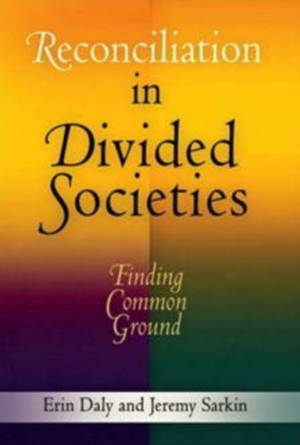
- Retrait gratuit dans votre magasin Club
- 7.000.000 titres dans notre catalogue
- Payer en toute sécurité
- Toujours un magasin près de chez vous
- Retrait gratuit dans votre magasin Club
- 7.000.0000 titres dans notre catalogue
- Payer en toute sécurité
- Toujours un magasin près de chez vous
60,95 €
+ 121 points
Description
Reconciliation in Divided Societies Finding Common Ground Erin Daly and Jeremy Sarkin "Erin Daly and Jeremy Sarkin . . . offer a breath-taking tour de force of the theory and practice of reconciliation. Their work is integrated and interdisciplinary. It moves effortlessly from law to literature, seamlessly from philosophy to psychology, and inclusively from art to history."--International Journal of Transitional Justice "An invaluable contribution to our understanding of conflict and reconciliation."--Negotiation Journal "As nations struggling to heal wounds of civil war and atrocity turn toward the model of reconciliation, Reconciliation in Divided Societies takes a systematic look at the political dimensions of this international phenomenon. . . . The book shows us how this transformation happens so that we can all gain a better understanding of how, and why, reconciliation really works. It is an almost indispensable tool for those who want to engage in reconciliation"--from the foreword by Archbishop Emeritus Desmond Tutu As societies emerge from oppression, war, or genocide, their most important task is to create a civil society strong and stable enough to support democratic governance. More and more conflict-torn countries throughout the world are promoting reconciliation as central to their new social order as they move toward peace and stability. Scores of truth and reconciliation commissions are helping bring people together and heal the wounds of deeply divided societies. Since the South African transition, countries as diverse as Timor Leste, Sierra Leone, Fiji, Morocco, and Peru, among others, have placed reconciliation at the center of their reconstruction and development programs. Other efforts to promote reconciliation--including trials and governmental programs--are also becoming more prominent in transitional times. But until now there has been no real effort to understand exactly what reconciliation could mean in these different situations. What does true reconciliation entail? How can it be achieved? How can its achievement be assessed? This book digs beneath the surface to answer these questions and explain what the concepts of truth, justice, forgiveness, and reconciliation really involve in societies that are recovering from internecine strife. Erin Daly is Professor of Law at Widener University in Wilmington, Delaware, specializing in American and comparative constitutional law. She is a member of the American Society of International Law and the U.S. Association of Constitutional Law. Jeremy Sarkin is Senior Professor of Law at the University of Western Cape in Cape Town, South Africa. A former acting judge in the Cape High Court, his recent books include Carrots and Sticks: The TRC and the South African Amnesty Process and The Administration of Justice: Comparative Perspectives. Pennsylvania Studies in Human Rights 2006 344 pages 6 x 9 ISBN 978-0-8122-3976-8 Cloth $65.00s £42.50 ISBN 978-0-8122-2124-4 Paper $26.50s £17.50 World Rights Political Science, Anthropology Short copy: As nations struggling to heal wounds of civil war and atrocity turn toward the model of reconciliation, Reconciliation in Divided Societies takes a systematic look at the political dimensions of this international phenomenon.
Spécifications
Parties prenantes
- Auteur(s) :
- Editeur:
Contenu
- Nombre de pages :
- 344
- Langue:
- Anglais
- Collection :
Caractéristiques
- EAN:
- 9780812221244
- Date de parution :
- 15-09-10
- Format:
- Livre broché
- Format numérique:
- Trade paperback (VS)
- Dimensions :
- 152 mm x 229 mm
- Poids :
- 494 g

Les avis
Nous publions uniquement les avis qui respectent les conditions requises. Consultez nos conditions pour les avis.






